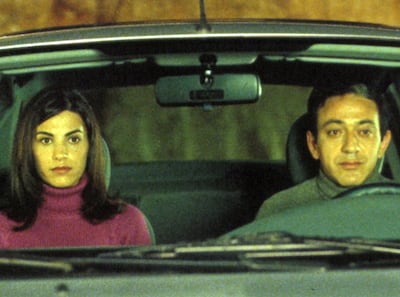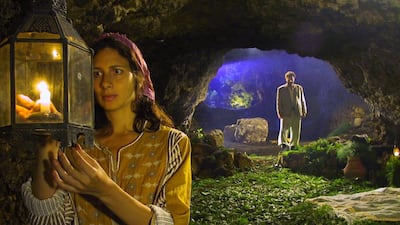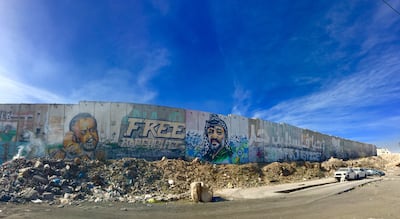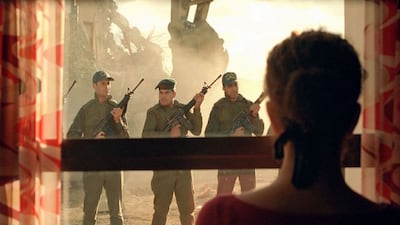Reel Palestine is holding a film programme at Cinema Akil to mark the Nakba, highlighting Palestinian stories and voices as the war in Gaza continues.
Running from May 15 to 19, the programme begins on the day that commemorates the Nakba of 1948 when Palestinians were expelled from their homes as a precursor to the creation of Israel.
The plight of the Palestinians continues today, with more than 34,800 people killed since the war began on October 7. There is another aspect to the conflict – one that involves the sidelining of Palestinian perspectives.
The Reel Palestine film programme, Permission to Narrate, is a reflection of this cultural conflict and takes its title from a 1984 essay by Edward Said. Responding to the Israel-Lebanese war, Said highlighted the West’s favouring of the Israeli narrative, an issue that many argue persists to this day.
Reel Palestine’s Permission to Narrate will spotlight six films, each of which delves into a different aspect of Palestinian identity in the face of occupation.
Divine Intervention (2002)
Directed by Palestinian filmmaker Elia Suleiman, Divine Intervention is a black comedy that revolves around the struggles of living in a Palestine segmented by Israeli checkpoints. The film follows two lovers, one living in Jerusalem and the other in Ramallah. With several Israeli checkpoints between the two cities, they have to overcome significant obstacles to meet each other.
Rana’s Wedding (2002)
In Rana’s Wedding, Palestinian filmmaker Hany Abu-Assad presents the Palestinian-Israeli conflict through a marriage drama. The film revolves around a girl, 17, named Rana (Clara Khoury) who is given an ultimatum by her father to either relocate with him to Egypt or stay in Palestine, provided she marry one of the men he lists in his letter. It is a decision she has to make within 10 hours before her father travels to Egypt.
Jenin, Jenin (2002)
This documentary that delves into the Jenin massacre, when Israel Defense Forces soldiers invaded the refugee camp in Jenin in April 2002 and 52 Palestinians were killed. Directed by Palestine actor and filmmaker Mohammed Bakri, the documentary has no narration and instead only features interviews with Jenin’s inhabitants. The film was a response to the silencing of the Palestinian perspective in relation to the clash.
Bab el Shams (2004)
Egyptian filmmaker Yousry Nasrallah’s adaptation of Bab el Shams was released a mere two years after the seminal novel by Elias Khoury. It is fitting that the film will be the first to screen at Permission to Narrate as it spans half a century of Palestinian history, beginning with the Nakba.
Screened in the 2004 Cannes Film Festival, the film revolves around a group of Palestinian refugees in Lebanon. It features several notable Arab stars, including Hiam Abbas, Orwa Nyrabia, Basem Samrah and Bassel Khayat.
The Tower (2018)
An animation by Norwegian director Mats Grorud, The Tower tells the story of an 11-year-old Palestinian girl living in a refugee camp in Lebanon. The film follows her attempts to learn more about her family’s history by the stories she hears from across three generations of refugees. The film has been shown at several film festivals across the world, including in Cairo, Busan, Rome, Thessaloniki and Annecy.
Tomorrow’s Freedom (2022)
The most recent film in the programme, Tomorrow’s Freedom, is directed by UK sisters Georgia and Sophia Scott. The film revolves around the story of Marwan Barghouti, an imprisoned Palestinian leader who had a pivotal role in the first and second intifadas.
The documentary is the consequence of the three years the Scott sisters spent with Barghouthi’s family in the West Bank, touching upon Barghouthi’s hunger strike in response to harsh prison conditions.
As the documentary’s description reads, Tomorrow’s Freedom “takes you on a brutally honest and transformative journey into the heart of the Israel Palestine conflict, speaking to Palestinians and Israelis on both sides.”
Screening times and more information available at cinemaakil.com
Read more about the coronavirus
Killing of Qassem Suleimani
Company profile
Name: One Good Thing
Founders: Bridgett Lau and Micheal Cooke
Based in: Dubai
Sector: e-commerce
Size: 5 employees
Stage: Looking for seed funding
Investors: Self-funded and seeking external investors
THE CLOWN OF GAZA
Director: Abdulrahman Sabbah
Starring: Alaa Meqdad
Rating: 4/5
The National Archives, Abu Dhabi
Founded over 50 years ago, the National Archives collects valuable historical material relating to the UAE, and is the oldest and richest archive relating to the Arabian Gulf.
Much of the material can be viewed on line at the Arabian Gulf Digital Archive - https://www.agda.ae/en
Mercer, the investment consulting arm of US services company Marsh & McLennan, expects its wealth division to at least double its assets under management (AUM) in the Middle East as wealth in the region continues to grow despite economic headwinds, a company official said.
Mercer Wealth, which globally has $160 billion in AUM, plans to boost its AUM in the region to $2-$3bn in the next 2-3 years from the present $1bn, said Yasir AbuShaban, a Dubai-based principal with Mercer Wealth.
“Within the next two to three years, we are looking at reaching $2 to $3 billion as a conservative estimate and we do see an opportunity to do so,” said Mr AbuShaban.
Mercer does not directly make investments, but allocates clients’ money they have discretion to, to professional asset managers. They also provide advice to clients.
“We have buying power. We can negotiate on their (client’s) behalf with asset managers to provide them lower fees than they otherwise would have to get on their own,” he added.
Mercer Wealth’s clients include sovereign wealth funds, family offices, and insurance companies among others.
From its office in Dubai, Mercer also looks after Africa, India and Turkey, where they also see opportunity for growth.
Wealth creation in Middle East and Africa (MEA) grew 8.5 per cent to $8.1 trillion last year from $7.5tn in 2015, higher than last year’s global average of 6 per cent and the second-highest growth in a region after Asia-Pacific which grew 9.9 per cent, according to consultancy Boston Consulting Group (BCG). In the region, where wealth grew just 1.9 per cent in 2015 compared with 2014, a pickup in oil prices has helped in wealth generation.
BCG is forecasting MEA wealth will rise to $12tn by 2021, growing at an annual average of 8 per cent.
Drivers of wealth generation in the region will be split evenly between new wealth creation and growth of performance of existing assets, according to BCG.
Another general trend in the region is clients’ looking for a comprehensive approach to investing, according to Mr AbuShaban.
“Institutional investors or some of the families are seeing a slowdown in the available capital they have to invest and in that sense they are looking at optimizing the way they manage their portfolios and making sure they are not investing haphazardly and different parts of their investment are working together,” said Mr AbuShaban.
Some clients also have a higher appetite for risk, given the low interest-rate environment that does not provide enough yield for some institutional investors. These clients are keen to invest in illiquid assets, such as private equity and infrastructure.
“What we have seen is a desire for higher returns in what has been a low-return environment specifically in various fixed income or bonds,” he said.
“In this environment, we have seen a de facto increase in the risk that clients are taking in things like illiquid investments, private equity investments, infrastructure and private debt, those kind of investments were higher illiquidity results in incrementally higher returns.”
The Abu Dhabi Investment Authority, one of the largest sovereign wealth funds, said in its 2016 report that has gradually increased its exposure in direct private equity and private credit transactions, mainly in Asian markets and especially in China and India. The authority’s private equity department focused on structured equities owing to “their defensive characteristics.”
MATCH INFO
Uefa Champions League final:
Who: Real Madrid v Liverpool
Where: NSC Olimpiyskiy Stadium, Kiev, Ukraine
When: Saturday, May 26, 10.45pm (UAE)
TV: Match on BeIN Sports
57%20Seconds
%3Cp%3E%3Cstrong%3EDirector%3A%3C%2Fstrong%3E%20Rusty%20Cundieff%0D%3Cbr%3E%3Cstrong%3EStars%3A%20%3C%2Fstrong%3EJosh%20Hutcherson%2C%20Morgan%20Freeman%2C%20Greg%20Germann%2C%20Lovie%20Simone%0D%3Cbr%3E%3Cstrong%3ERating%3A%20%3C%2Fstrong%3E2%2F5%0D%3Cbr%3E%0D%3Cbr%3E%3C%2Fp%3E%0A
Our legal columnist
Name: Yousef Al Bahar
Advocate at Al Bahar & Associate Advocates and Legal Consultants, established in 1994
Education: Mr Al Bahar was born in 1979 and graduated in 2008 from the Judicial Institute. He took after his father, who was one of the first Emirati lawyers
If you go
The flights
Emirates and Etihad fly direct to Nairobi, with fares starting from Dh1,695. The resort can be reached from Nairobi via a 35-minute flight from Wilson Airport or Jomo Kenyatta International Airport, or by road, which takes at least three hours.
The rooms
Rooms at Fairmont Mount Kenya range from Dh1,870 per night for a deluxe room to Dh11,000 per night for the William Holden Cottage.
Three ways to limit your social media use
Clinical psychologist, Dr Saliha Afridi at The Lighthouse Arabia suggests three easy things you can do every day to cut back on the time you spend online.
1. Put the social media app in a folder on the second or third screen of your phone so it has to remain a conscious decision to open, rather than something your fingers gravitate towards without consideration.
2. Schedule a time to use social media instead of consistently throughout the day. I recommend setting aside certain times of the day or week when you upload pictures or share information.
3. Take a mental snapshot rather than a photo on your phone. Instead of sharing it with your social world, try to absorb the moment, connect with your feeling, experience the moment with all five of your senses. You will have a memory of that moment more vividly and for far longer than if you take a picture of it.








